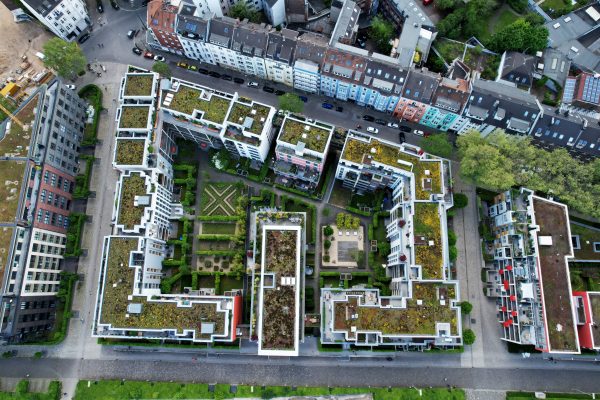
The construction industry has witnessed a significant shift towards sustainable building practices, driven by a growing awareness of environmental issues and the need for more efficient resource management. Therefore, sustainable building technologies once considered a niche market, are now becoming mainstream, particularly in residential construction. This shift is not only beneficial for the environment but also offers substantial financial returns.
Moreover, according to a new study from Dodge Data & Analytics, building owners and investors report, on average, a 10% reduction in operating costs within the first year of implementing green building movement, and this figure increases to over 16% within five years. This blog explores the return on investment (ROI) of sustainable building technologies in residential construction, examining the economic, environmental, and social benefits that make them an attractive choice for homeowners, builders, and investors alike.
Understanding Sustainable Building Technologies
Sustainable building technologies encompass a wide range of practices and products designed to reduce the environmental impact of construction and enhance the energy efficiency of buildings. Key technologies include:
Energy-Efficient Appliances and Systems
These include high-efficiency HVAC systems, LED lighting, and energy-efficient windows and insulation that reduce energy consumption.
Renewable Energy Sources
Moreover, solar panels, wind turbines, and geothermal systems provide clean, renewable energy, reducing reliance on fossil fuels.
Water Conservation Systems
Low-flow fixtures, rainwater harvesting systems, and greywater recycling reduce water usage and waste.
Sustainable Building Materials
Materials like bamboo, recycled steel, and low-VOC (volatile organic compounds) paints minimize environmental impact and improve indoor air quality.
Smart Home Technologies
Home automation systems that optimize energy use, improve security, and enhance convenience.
At BizForce, our skilled architects can integrate these sustainable solutions into every project, ensuring you achieve both ecological and economic benefits.
Economic Benefits of Sustainable Building Technologies
The economic ROI of sustainable building technologies is a primary consideration for many stakeholders. Here’s how these technologies can lead to significant financial gains:
Lower Energy Bills
Energy-efficient appliances and renewable energy sources drastically reduce monthly utility bills. For example, a home equipped with solar panels can generate its own electricity, leading to savings on electricity costs. Over time, the savings generated can recoup the initial investment in sustainable technologies.
Increased Property Value
Moreover, homes equipped with sustainable features frequently command higher resale values. In fact, according to a study by the National Association of Home Builders, homebuyers are willing to pay more for a green-certified home. Buyers are increasingly willing to pay a premium for energy-efficient, environmentally friendly homes.
Tax Incentives and Rebates
Additionally, governments at various levels offer tax credits, rebates, and other incentives to encourage the adoption of sustainable building technologies. Furthermore, these incentives can significantly reduce the upfront costs, enhancing the overall ROI.
Reduced Maintenance Costs
Lastly, sustainable building materials and systems are often more durable and require less maintenance than traditional counterparts. For instance, LED lighting lasts longer than incandescent bulbs, and low-flow plumbing fixtures reduce the wear and tear on water heaters and pumps.
Environmental Benefits and Long-Term Savings
While the economic benefits are compelling, the environmental advantages of sustainable building technologies contribute to long-term savings and broader ROI:
Reduced Carbon Footprint
By utilizing renewable energy sources and energy-efficient systems, sustainable homes contribute to lower greenhouse gas emissions. Moreover, this reduction in carbon footprint not only benefits the environment but also aligns with global efforts to combat climate change.
Resource Conservation
Additionally, sustainable technologies promote the efficient use of resources, reducing waste and preserving natural resources. For example, water conservation systems help mitigate the impact of water scarcity, ensuring that homes remain habitable even in areas prone to drought.
Enhanced Resilience
Moreover, sustainable homes are often designed to be more resilient to extreme weather events, which are becoming more frequent due to climate change. Therefore, features like improved insulation, storm-resistant windows, and efficient drainage systems help protect homes from damage, reducing repair and replacement costs over time.
Social and Health Benefits of Sustainable Building Technologies
The ROI of sustainable building technologies extends beyond financial and environmental gains, encompassing significant social and health benefits:
Improved Indoor Air Quality
Sustainable building materials, such as low-VOC paints and finishes, contribute to healthier indoor environments. Moreover, improved air quality can reduce respiratory issues and other health problems, leading to better overall well-being for residents.
Enhanced Comfort and Well-Being
Additionally, energy-efficient homes with advanced HVAC systems provide consistent indoor temperatures and better humidity control, enhancing comfort. Smart home technologies add convenience and improve quality of life.
Community and Social Impact
Lastly, sustainable construction practices contribute to the development of greener, healthier communities. Therefore, by reducing environmental impact and promoting energy independence, these technologies foster a sense of social responsibility and community well-being.
Real-World Example: ROI in Solar-Powered Homes
A study by Berkeley Lab found that homes with solar panels sold for about $15,000 more than comparable homes without solar power. Moreover, homeowners not only benefited from lower energy bills but also saw a substantial return on their investment when selling their properties.
Conclusion

The ROI of sustainable building technologies in residential construction is multifaceted, encompassing economic, environmental, and social benefits. Additionally, as the demand for energy-efficient, environmentally friendly homes continues to grow, the financial advantages of these technologies become increasingly evident. Lower energy bills, increased property values, and various incentives make sustainable building technologies a smart investment, without a doubt. Moreover, the long-term environmental and health benefits contribute to a more sustainable and resilient future.
Embracing sustainable building technologies is not just a trend but a necessary evolution in the construction industry. Therefore, by prioritizing sustainability, we can achieve significant returns on investment while contributing to the well-being of our planet and future generations.
At BizForce, our team of talented architects is dedicated to integrating sustainable practices into every project. Whether you’re looking to reduce environmental impact, enhance energy efficiency, or boost property value, our architects have the expertise to help you achieve your goals. Partner with BizForce today and be a part of the green building revolution.
Contact us here.
